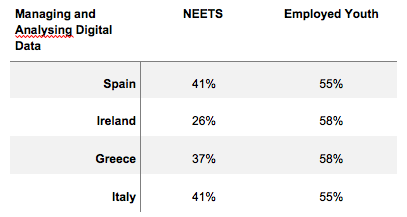Unlike the many projects of the Fund for Youth Employment family that provide direct support to young people and especially NEETs in the form of training, coaching and mentoring (such as, for example YES!, YOUTHShare, SEPAL, StayOn), our work in Cowork4YOUTH is basically performed behind the scenes. As a research & analysis project we do not target specific individuals, nor promote a specific set of skills. When it comes to the NEETs affected, our contribution is rather indirect, consisting in identifying the skills that should be targeted, and the ways (the policies) that can promote this goal.
Our research and policy outputs that focus on skills such as the “Transnational Report on NEETs, skills gap and employment policies in peripheral European Countries”; the “Review paper on state-of-the-art of living wage & re-/ up-skilling policies for NEETs”; and the “Policy recommendations addressing skills gap and brain drain” serve exactly this purpose. In essence, our skills agenda is defined by the conclusions of these works.
The full image will be completed by the end of the year; nevertheless, the ongoing work is already revealing some very interesting facts that show how such an agenda can be constructed.
For instance, the aforementioned Transnational Report (1) includes a detailed comparative analysis on the skills that NEETs and employed youth have developed and used in the four countries that Cowork4YOUTH focuses on (Greece, Ireland, Italy and Spain). Confirming the notion of the significance of digital skills in our era, and the attention paid to digital transition, Managing and analysing digital dataemerges as a skill which NEETs lack in a great degree compared to their employed counterparts, in all four countries.

Other fields with a striking gap between NEETs and employed youth concern developing solutions to problems; making decisions; goal setting; and coordinating activities with others. It is evident that this set of soft skills are highly connected with practical working experience in positions that provide the employee some space for initiative. This observation can be important when one tries to find ways to improve NEETs employability.
Improving employability however, cannot have the desired results in places where there are not enough employment opportunities.
Focusing on non-metropolitan regions in energy transition and regions that are highly dependent on tourism, Cowork4YOUTH also needs to identify how such regions can exploit their potential to offer good quality jobs to the local youth and especially the NEETs. To put it in another way, the question could be “How can the particular regional economies grow in line with European and global developments”.
Under this scope, it is vital that regions support job creation, especially in sectors that may still not be that developed in the local ecosystem. And the Youth, with their creative potential can be a driving force for responding to this challenge. To exploit this potential it is crucial that the young develop innovation, entrepreneurial and networking skills. Through them they can build initiatives that fit the European and global socioeconomic trends such as the digital and green transition, and foster extroversion that is so much needed in such regions.
(1) The report by Romero, Oses and Judge has recently been finalized and it will soon enter the stage of publication. The work has been coordinated by the ISEAK Foundation.
Stay connected with us through our social media:
facebook, Twitter, LinkedIn: @Cowork4YOUTH, and visit our website https://www.cowork4youth.org/


